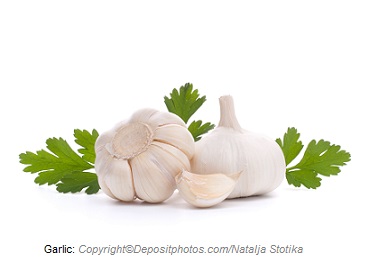A worldwide known vegetable for its health benefits, garlic is from allium family and  related to leek and onion. The seed of the plant which makes bulb is called clove. It weighs approximately 3 grams. 3 cloves of garlic provide 3 grams of carbohydrates and 1 gram of protein. This vegetable is very poor in fiber.
related to leek and onion. The seed of the plant which makes bulb is called clove. It weighs approximately 3 grams. 3 cloves of garlic provide 3 grams of carbohydrates and 1 gram of protein. This vegetable is very poor in fiber.
Average calories: 16 per 3 cloves.
|
Garlic: 3 cloves |
|
|
Carbohydrate |
3 |
|
Fiber |
0 |
|
Protein |
1 |
|
Fat |
0 |
|
Calories |
16 |
Vitamins found in higher amounts: vitamins C and B6.
Minerals found in higher amounts: manganese, selenium and calcium.
Phytonutrients found in higher amounts and their health benefits: though garlic is poor in most of the vitamins and minerals, it is famous as the “king of vegetables” and “poor man`s antibiotic” due to its phytochemicals. The phytonutrients present in garlic include allicin, alliin, ajoene, allyl sulfides, flavonoids (quercetin and kaempferol), and phenolic compounds (caffeic acid and ferulic acid).
Allicin is a sulfur-containing phytochemical in garlic. It is a natural antibiotic that has antibacterial, antiviral, antifungal, anti-inflammatory, and anti-thrombotic properties and reduces risk of atherosclerosis.
Alliin is a potent antioxidant with immune-enhancing activity. When chopping or crushing fresh garlic, the aroma is due to conversion of alliin into allicin.
Ajoene is another sulfur-containing compound in garlic with antibacterial, antifungal, anti-cancer and anti-thrombotic effects.
There are more sulfur-containing phytochemicals in garlic.
Flavonoids and phenolic compounds are powerful antioxidants that have anti-inflammatory, anti-cancer, and immune-boosting abilities.
Certain health benefits attributed to garlic are:
- Reduces atherosclerosis and heart diseases.
- Lowers bad cholesterol and blood pressure.
- Helps prevent from cancers.
- Reduces platelet aggregation followed by risk of blood clotting.
- Helps control blood sugar easily.
- Reduces risk of bacterial, viral, fungal and parasitic infections.
Allyl methyl sulfide (AMS) is one of the sulfur-containing constituents in garlic and it is responsible for garlic strong smell (garlic breath), as it cannot be digested quickly and it goes directly to the blood, being excreted through the lungs and skin from the body. The volatile oils in parsley could neutralize the garlic breath to some extent.

